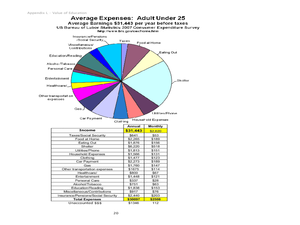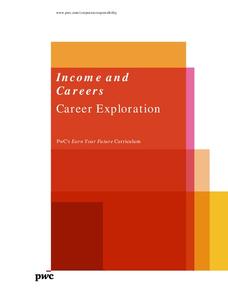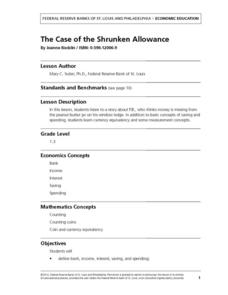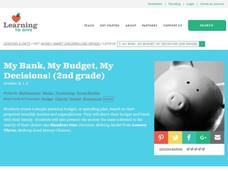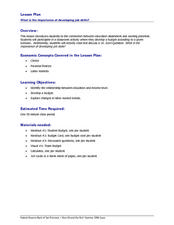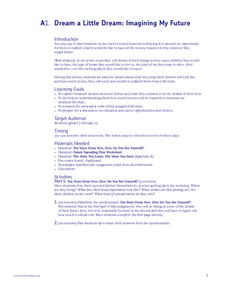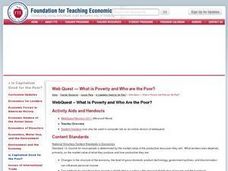Federal Reserve Bank
Gini in a Bottle: Some Facts on Income Inequality
Delve into the hard numbers and fundamental concept of income inequality in the United States, using graphs, detailed reading materials, and an organized instructional activity.
Federal Reserve Bank
Invest in Yourself
What are the different ways that people can invest in their human capital for a better future? Pupils participate in an engaging hands-on activity and analyze data regarding unemployment, the ability to obtain an education, and median...
Council for Economic Education
The Economics of Income: If You’re So Smart, Why Aren't You Rich?
If basketball players make more than teachers, why shouldn't learners all aspire to play in the NBA? Unraveling the cost and benefits of education and future economic success can be tricky. Economic data, real-life cases, and some...
Curated OER
Earned Income Credit
Learners distinguish between tax deduction and tax credit, explain how the earned income credit affects the tax liability, apply requirements to claim the earned income credit, and describe factors that determine the amount of the earned...
Curated OER
Value of Education: Education and Earning Power
Students explore the earning power of someone with a post-high school education. In this education and income lesson, students evaluate examples of occupations, their salaries, and education level needed for the job. Students calculate...
Federal Reserve Bank
“W” Is for Wages, W-4 and W-2
Don't let your young adults get lost in the alphabet soup of their paychecks and federal income taxes. Using sample pay stubs and reproductions of government forms, your class members will identify the purpose of such forms as a W-4 and...
PwC Financial Literacy
Income and Careers: Career Exploration
Elementary schoolers take part in a virtual career day and are exposed to various career opportunities in the finance, education, and medical fields. By accessing a video you can download from the PwC Financial website, learners "shadow"...
PwC Financial Literacy
Planning and Money Management: Spending and Saving
Financial literacy is such an important, and often-overlooked, skill to teach our young people. Here is a terrific lesson which has pupils explore how to come up with a personal budget. They consider income, saving, taxes, and their...
Federal Reserve Bank
The Case of the Shrunken Allowance
An allowance is an important thing! Make sure your kids know how to save and spend their own money. Using the book The Case of the Shrunken Allowance as a starting point, this plan covers income, spending and saving, counting, and more.
Curated OER
Interest Income
Students identify taxable interest income, and report taxable and tax-exempt interest income.
Visa
A Plan for the Future: Making a Budget
From fixed and variable expenses to gross income and net pay, break down the key terms of budgeting with your young adults and help them develop their own plans for spending and saving.
Federal Reserve Bank
Would Increasing the Minimum Wage Reduce Poverty?
Here is a fantastic and relevant question to discuss with your class members. Using detailed reading material and a related worksheet, your learners will learn about labor markets, equilibrium wages, price floors, and who exactly would...
Curated OER
My Bank, My Budget, My Decisions
Students create a personal budget. In this financial planning lesson, students create a budget using income data and identify ways to save a portion of money for donations.
Curated OER
Labor Markets
Students examine labor markets by participating in an employer/employee simulation and in group discussions. They discuss mandated employee benefits and predict the effect they have on various parties.
Curated OER
What is the Importance of Developing Job Skills?
Financial literacy is the way to teach! The class works in small groups to discover the relationship between education and income level. They use their math and problem-solving skills to complete two different activities. They work out a...
Illustrative Mathematics
Kimi and Jordan
Kimi and Jordan have taken summer jobs to supplement their weekly allowances. Kimi earns more per hour than Jordan, but Jordan's weekly allowance is greater. This activity asks students to determine how the incomes of the two workers...
Federal Reserve Bank
Lesson 4: Back to School
Based on your current level of human capital, how long would it take you to earn $1,000,000? What about your potential human capital? Learners explore the importance of education and experience when entering the workforce, and compare...
Curated OER
Dream a Little Dream: My Future
What will the future hold? How can I make my dreams come true? Since learners don't have fairy god mothers, they'll need to develop strong goal-oriented plans. They concoct ideas of their dream life, determine the type of income needed...
ProCon
Penny
Twenty-nine percent of Americans want to abolish the one-cent coin, which begs the question: Is a penny saved really a penny earned? Scholars read fascinating facts about the history of the penny in preparation for a class debate or...
Council for Economic Education
A Penny Saved
A penny saved is a penny earned! Scholars research the different ways to save money over a lifetime. They investigate the Rule of 72, compound interest, and sub-prime loans to gain an understanding of how banks aid in the saving process....
Curated OER
WebQuest- What is Poverty and Who Are the Poor?
Students are introduced to a variety of easily accessible data about poverty. The search activity performs double-duty in exposing students to the nature and magnitude of world poverty and in confronting them with different types and...
Wells Fargo
Hands on Banking
Cha-ching! You just hit the jackpot with this interactive consumer math unit. Supported by a series of online lessons and activities, these lessons engage students in applying their math skills to real-life personal finance problems...
Global Oneness Project
Citizen Photojournalism
Matt Black's photo essay, "The Geography of Poverty" provides a shocking reminder of the poverty that exists in the United States. The resource not only focuses attention on poverty but also conditions that have given rise to situation...
Curated OER
Understanding Your Pay and Paycheck
Pupils discuss as a class, the time delay between the end of a pay period and a person's paycheck. They discuss the difference between gross pay and net pay, and identify the different figures on the sample checks or the check stubs...






